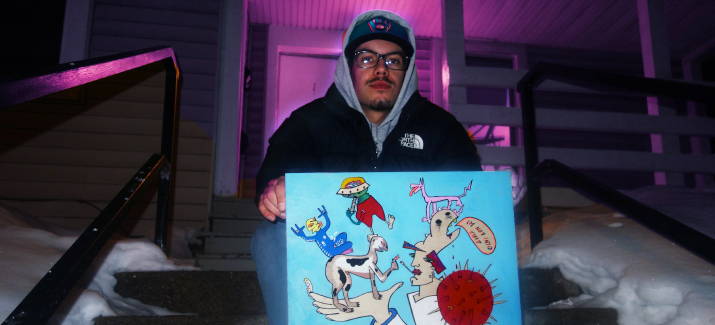Growing up in California, Nelson Institute graduating senior Juan Antonio Torres experienced first-hand the devastating effects of droughts and forest fires, causing him to think critically about conservation efforts and the environment.
He combined his interest for the natural world with his talent for art at the University of Wisconsin – Madison by double majoring in environmental studies and art.
In addition to academics, Torres is working to implement environmentalism into several aspects of his daily life and is teaching others about the human impact on the environment through his artwork.

With a focus on printmaking, Torres quickly learned that the art industry can be very wasteful due to improper disposal of chemicals or using products and materials that require nonrenewable resources or excess amounts of plastic.
In his environmental studies class, People, Land and Food: Comparative Study of Agricultural Systems, Torres had the opportunity to address this problem by creating a sustainable plan for art studios as part of a class project.
He researched the impacts that art studios had on the environment and created an outline to make them more sustainable, including a list of environmentally friendly products to use, how to properly dispose of chemicals, and eco-friendly replacements for art supplies and materials.
Torres admits that some concepts of environmental studies can be difficult, but he says he enjoys the challenge of spreading awareness through art.
“It can be hard to talk about these things, but a drawing or a painting can be a nice way to break the ice and moving forward that’s something I’m going to keep working on,” Torres said.
His artwork consists of cartoon-style pieces that give his audience a different way to understand complex environmental issues and fosters space to start a conversation.
In the future, Torres hopes to open his own studio focusing on sustainable practices and spreading environmental messages with the public through his artwork.

Torres also draws on past historical events to deepen his understanding of the environment and find connections to his own identity.
“I come from a Latino background, and I’ve been learning about colonialism in South America and how that impacted whole species and plants and what that means for us today. It’s like we almost forget so much of what the past has to teach us, and there’s a wealth of knowledge there,” he says.
He credits the Nelson Institute with expanding his understanding of environmentalism through a global lens.
“I didn’t realize how drastically we were negatively impacting the Earth as humans, and for how long we’ve been doing it. Nelson Institute helped me gain that knowledge,” he said.
Most recently, in course titled Global Environmental History taught by Professor Alexander Statman, Torres completed a paper assessing the impact of European writings in Mesoamerica, and how historical language translations and words affect how modern society understands and perceives the natural world.
He explains that the environmental studies major with Nelson Institute is for everyone.
“It’s really important for any person from any major to learn about environmental issues because it’s really impactful,” he says.
“There are times where it gets heavy, sometimes you find yourself thinking ‘I don’t know what we can do about this’, but part of that is learning what you can do every day, step by step.”
See more of Torres’ work on his website or visit his Instagram profile.